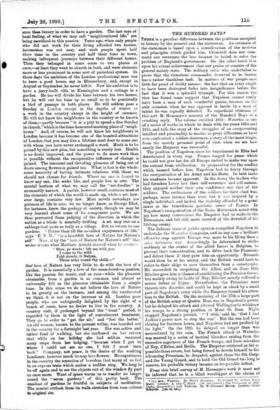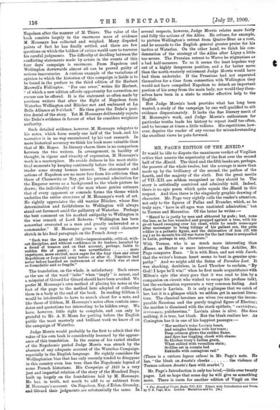THE HUNDRED DAYS.*
THNRIE is a. peculiar difference between the positions occupied in history by the general and the statesman. An estimate of the statesman is based upon a consideration of the motives and principles which guided him, Cromwell does not com- mand our- reverence the less because he failed to solve the problem of England's government. On the other hand, it is upon his actual achievement that our praise or censure of the general mainly rests. The military critic who undertakes to prove that the victorious commander deserved to be beaten has a rather thankless task. In matters of war people care little for proof of faulty means; the fact that an army ought to have been destroyed fades into insignificance before the fact that it won a- splendid triumph. For this reason the view has found some support that Napoleon cannot really have been a man of such wonderful genius, because on the only occasion when he was opposed in battle by a man of talent he was signally defeated. To superficial criticism of this sort M. Houssa.ye's account of the Hundred Days is a crushing reply. The volume entitled 1815: Waterloo is one of aseries of works in which he deals with the years 1814 and 1815, and tells the story of the struggles of an overpowering intellect and personality to master as great difficulties as have ever confronted a soldier-statesman, a story all the more tragic, from the merely personal point of view, when we see how nearly the Emperor was successful.
The position of Napoleon since his banishment to Elba had deteriorated in every way. France longed for peace which he could not give her, for all Europe united to make war upon the outcast from civilisation. In preparation for the conflict which loomed before him, Napoleon had to hurry through the reorganisation of his Army and his State. In both tasks his weakness became apparent. In the Army the leaders who had forsaken Louis lost their self-reverence and self-esteem, they enjoyed neither their own confidence nor that of the soldiers. The enthusiasm of the soldiers for their chief was, perhaps, more intense than ever, but it was inspired by a single individual, and lacked the stability afforded by a great cause or the tumultuous patriotic sense of France. In Napoleon's reorganisation of the State, Metternich noted with joy how many concessions the Emperor had to make to the Democrats, and felt still more assured of the downfall of his lifelong enemy.
The dubious state of public opinion compelled Napoleon to
undertake the Waterloo Campaign, and in any case a brilliant offensive coup against Europe was more to his liking than a safer defensive war. Accordingly, he determined to strike suddenly, at the centre of the allied forces in Belgium, to prevent their concentration, and to drive back the Prussians and defeat them if they gave him an opportunity. Brussels would then be at his mercy, and the British would have to retire to their ships to save themselves from a catastrophe. He succeeded in surprising the Allies, and on June 16th Blucher gave him a chance of annihilating the Prussian forces, but mainly owing to faults of Ney, Bliicher merely suffered a severe defeat at Ligny. Nevertheless, the Prussians were thrown into disorder, and could be kept in check by a small part of Napoleon's army while the Emperor turned his atten- tion to the British. On the morning of the 17th a large part of the British army at Quake Bras was in Napoleon's power, but he delayed his attack and allowed Wellington to withdraw his troops to a strong position at Mont St. Jean. Night stopped Napoleon's pursuit. "I wish,' said he, that I bad Joshua's power now to stop the sun.' But the sun had been shining for fourteen hours, and Napoleon had not profited by its light." On the 18th he delayed no longer than was necessitated by the rain. The French attack at Waterloo was marred by a series of tactical blunders arising from the excessive eagerness of the French troops, and from mistakes of Ney, d'Erlon, and Belle. The Emperor retrieved as far as possible these errors, but being forced to devote himself to the advancing Prussians, to despatch against them the 6th Corp: and the Young Guard, and to hold the Old Guard too long in reserve, his probable victory became an irreparable defeat.
From this brief survey of M. Ifoussaye's work it must not be inferred that he is a blind worshipper at the shrine of
• (1.) : Waterloo. By Henry Houssaye. Translated by Arthur Emile Mann. London : A. and C. Black. [10s net.]—(2.) The Campaign of 1816: "AMA Qualr■Bras, and Wateraso. By W. O'Connor Morris. London : Grant Mahar& Dila ed. 5e54 Napoleon after the manner of M. Thiers. The value of the book consists largely in the enormous mass of evidence M. Houssaye has collected and weighed. Many. disputed points of fact he has finally settled, and there are few questions on which the boldest of critics would care to traverse his careful judgments. The difficulty of deciding between the conflicting statements made by actors in the events of this four days' campaign is enormous. From Napoleon and Wellington downwards almost all can be proved guilty of serious inaccuracies. A curious example of the variations of opinion to which the historian of this campaign is liable is to be found in the preface to the third edition of Sir Herbert Maxwell's Wellington. "For one error," writes Sir Herbert, "of which a new edition affords opportunity for correction, no excuse can be offered. It is the statement so often made by previous writers that after the flight of Napoleon from Waterloo Wellington and Bliicher met and embraced at La Belle Alliance at 9 o'clock." He then gives the Duke's posi- tive denial of the story. Yet M. Houssaye deliberately rejects the Duke's evidence in favour of what be considers weightier authority.
Such detailed evidence, however, M. Houssaye relegates to his notes, which form nearly one half of the book, and his narrative is in no way encumbered by his vast research. In mere historical accuracy we think his book more valuable than that of Mr. Ropes. In literary charm there is no comparison between the two writers. In arrangement, in lucidity of thought, in vigour and vivacity of expression, M. Houssaye's work is a masterpiece. He avoids dulness in his most statis- tical moments by keeping continually before the mind of the reader some strong human interest. The statements and actions of Napoleon are no more free from his criticism than those of Clausewitz or Ney, yet his personal admiration for the Emperor serves as a background to the whole picture he draws; the individuality of the man whose genius outsoars that of every opponent or comrade forms the theme which underlies the entire structure of M. Houssaye's work of art. He rightly appreciates the old warrior Blucher, whose fine determination and faithfulness to Wellington will always stand out foremost amid the gallantry of Waterloo. Perhaps the best comment on his marked antipathy to Wellington is the wise remark of Lord Roberts: "Wellington has been somewhat overrated as a man and greatly underrated as a commander." M. Houssaye gives a very vivid character sketch in his final paragraph on the French Army :— " Such was the Army of I815—impressionable, critical, with- out discipline, and without confidence in its leaders, haunted by a dread of treason and on that account, perhaps, liable t
sudden fits of panic ; it was nevertheless more
or°e impetuous, more excited, more eager for the fray than any other Republican or Imperial army before or after it. Napoleon had never before handled an instrument of war which was at once so formidable and so fragile."
The translation, on the whole, is satisfactory. Such errors as the use of the word " infer " when " imply " is meant, and a misprint of Gerard for Girard should have been avoided. We prefer M. Houssaye's own method of placing his notes at the foot of the page to the method here adopted of collecting them in a body at the end of the book. In reading Gibbon it would be intolerable to have to search about for a note, and like those of Gibbon, M. Houssaye's notes often contain anec- dotes and quotations too interesting to be hidden away. We have, however, little right to complain, and can only be grateful to Mr. A. E. Mann for putting before the English public the most masterly and brilliant work we know of on the campaign of Waterloo.
Judge Morris would probably be the first to admit that the value of his own book is considerably lessened by the appear- ance of this translation. In the course of his varied studies of the Napoleonic period Judge Morris was struck by the absence of any adequate account of the Waterloo Campaign, especially in the English language. He rightly considers the Wellingtonian bias that has only recently tended to disappear
in this country even less true than the Napoleonic legend of some French historians. His Campaign of 1815 is a very just and impartial relation of the story of the Hundred Days, built up largely on the foundations laid by M. Houssaye. He has, in truth, not much to add to or subtract from M. Houssaye's account. On Napoleon, Ney, d'Erlon, Grouchy, and Gerard their judgments are substantially the same. In several respects, however, Judge Morris relates more fairly. and fully the actions of the Allies. He refuses, for example, to picture Wellington's retreat from Quatre-Bras as a rout, and he accords to the English general greater praise for his tactics at Waterloo. On the other hand, we think his con- demnation of the strategy of the Allies after Ligny a little too severe. The Prussian retreat to Wavre he stigmatises as a bad half-measure. To us it seems the least hopeless way out of a highly dangerous position, and a far better move than the north-westerly retirement Judge Morris would have had them undertake. If the Prussians had not separated themselves for a time from connection with Wellington they would not have compelled Napoleon to detach an important portion of his army from the main body, nor would they them- selves have been in a state to render effective help to the English.
But Judge Morris's book provides what has long been wanted, a study of the campaign by one well qualified to sift evidence dispassionately. It lacks the fine literary merit of M. Houssaye's work, and Judge Morris's enthusiasm for particular truths leads his history to repeat itself too often, , and to become at times a little tedious. His repetitions, how- ever, deprive the reader of any excuse for misunderstanding the excellent views he puts forward.



































 Previous page
Previous page